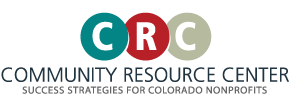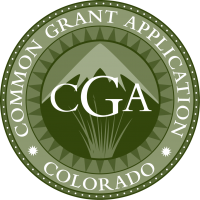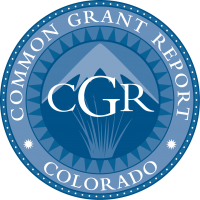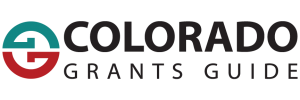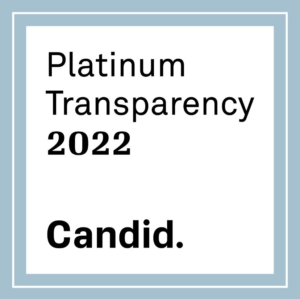Colorado’s Common Grant Forms
Welcome to the online home for Colorado’s:
The Common Grant Application and Common Grant Report allow Colorado grantmakers and grantseekers to work from a common set of questions that reinforce solid nonprofit practices. At the same time, the CGA and CGR save grantseekers time and effort by enabling them to use a single form for many different applications and reports. Please be aware that grantmakers may accept one of these forms but not all three. Learn which grantmakers accept which form(s).
The Colorado Common Grant Application and Report are excellent teaching tools that outline the critical components of a competitive grant proposal. CRC offers a variety of trainings that focus on using the CGA and CGR for your organization’s fund development needs.
General Information
History of the Colorado Common Grant
In late 2005, a group of nonprofit organizations and grantmakers met to discuss whether it was time to review, revise, and fine-tune Colorado’s Common Grant Application (CGA) that had been created in 1993. Recognizing that the world had changed considerably in the intervening years, this ad hoc group agreed that it was time to update the CGA and by the middle of 2006, the effort was in full swing, with a new CGA released in April of 2008. Many individuals who served on the committee to revise the Common Grant Application continued their service to Colorado’s nonprofit sector in the revision of the Common Grant Report (CGR) in 2009. The original CGR was launched in 2002.
The revision processes were inclusive and extensive, engaging broad representation from nonprofits, grantmakers, academicians, and capacity-building organizations. These stakeholders worked together to ensure the creation of tools that would be valuable to both grantseekers and grantmakers.
Three driving principles guided the process:
- Build upon the success of the past
- Actively engage people in a deliberate and objective process
- Enhance the opportunity for nonprofit organizations to tell their story while reinforcing “best practices” of nonprofit management and leadership
How was this done? Deliberately, patiently, objectively. At each step, there were surveys, focus groups, expert working groups, testing, re-testing, piloting, and hours of discussions. The deliberate outreach included nonprofit executives, development staff, neophytes, experts, CEOs of grantmaking organizations, program officers, grants management staff, capacity building trainers, and consultants. The Colorado group contrasted its efforts with others nationally, conducted a comprehensive literature review and then puzzled, scrutinized, reviewed, and debated some more.
During the same time period that the CGA was undergoing revision, the Colorado Nonprofit Association produced a publication titled Principles and Practices for Nonprofit Excellence in Colorado. The document serves as a resource for organizations by covering best practices related to nonprofit management issues, accountability, and transparency. The revised CGA and CGR and the Principles and Practices document share common goals — to increase the capacity of the nonprofit sector to deliver on its mission and to help elevate the recognition of the sector as a force absolutely vital to the well-being of Coloradans.
In 2008, recognizing the importance of these efforts, Colorado Attorney General John W. Suthers and Colorado Secretary of State Mike Coffman endorsed the use of the revised CGA in recognition of its value in reinforcing best practices and ultimately leading to a strengthened nonprofit sector.
In late 2009, the Common Grant Application for Capital Campaigns (CGA-Capital) was created by tweaking the CGA to make it more suitable for grantmakers reviewing capital campaign requests.
Efforts related to the Colorado’s Common Grant Forms have occurred on an ad hoc basis based on the interests and energy of grantmakers, technical assistance providers, and grantseekers. Click here for a full list of volunteers involved in the effort.
Which form do I use?
Use the flow chart below to determine the correct grant form you should use for your grant request.
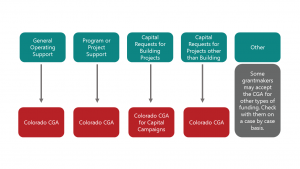
Who accepts these forms?
Click here for a list of grantmakers that accept the Common Grant Application and/or the Common Grant Report. Some grantmakers give applicants the choice of either using the CGA and CGR or a format specified by the grantmaker. Others on this list accept the common forms – and only use the common forms. Still other grantmakers will require additional information for their applications or reports, or they have made slight modifications to the application or report. Others may require a letter of intent prior to receiving an application. Therefore, it is critical that grantseekers visit grantmaker websites for the most up-to-date information about individual funding entities areas of interest, application requirements, deadlines, modifications to the CGA, reporting requirements, and other pertinent information. It would be a shame to waste time and energy on writing a grant that is quickly dismissed because it doesn’t fit with a grantmaker’s guidelines. Thorough research of your potential new funder is a critical step in the application process.
The Common Grant Application for Capital Campaigns is the newest common form. It was released in September 2009. If you are submitting a capital request and there is no indication that the grantmaker you are applying to accepts the CGA-Capital, it is worth checking with them to determine their interest in using this specialized CGA.
While this list is updated twice a year, we cannot guarantee that it is completely accurate. Again, check each grantmaker’s website prior to submitting an application or report. Where available, a link to the grantmaker’s website is provided.
Note: Each of the grantmakers that accepts the CGA has different funding priorities and areas of interest. Prior to submitting a proposal, it is your responsibility to determine whether your organization meets a grantmaker’s guidelines and funding priorities. Always check each grantmaker’s website for the most current information on their grant application and reporting requirements, and contact them if you have questions.
All information was pulled from the Colorado Grants Guide database. Be sure to check with each funder for their most recent guidelines and requirements.
Acknowledgements
ACKNOWLEDGEMENTS: COMMON GRANT APPLICATION
Revising Colorado’s Common Grant Application (CGA) was a volunteer effort that required untold hours of work from many individuals extremely dedicated to enhancing Colorado’s nonprofit sector.
From start to finish, the project took over two years. The work was carried forward by the following committees: Executive Committee, Drafting Committee, Communications Committee, Technology Committee, User’s Guide Working Group, Beta Test Working Group, Rollout Working Group, and Training Working Group.
Sincere thanks to the individuals involved for generously sharing their time and talent. In addition, sincere thanks to their employers for allowing them the flexibility to spend time on this project.
Rebecca Arno, The Denver Foundation (Communications, Roll-Out)
Noah Atencio, Daniels Fund (Drafting, Technology)
Erin Binford, The Buell Foundation (Drafting, User’s Guide, Training)
Jody Camp, Women’s Foundation of Colorado (Drafting)
Lisa Cirincione, JVA Consulting (Drafting, User’s Guide, Training, Rollout)
Hannah Clampitt, Community First Foundation (Technology)
Tom Currigan, Kaiser Permanente (Executive, Rollout)
Peter Droege, Daniels Fund (Communications)
Kelly Felice, Metropolitan State College of Denver (Communications)
Sarah Fischler, Susan G. Komen Breast Cancer Foundation and Community Resource Center (Drafting – chair, Beta Test – chair, Rollout – chair, Training, Executive)
Susan France, Bonfils-Stanton Foundation (Communications)
Janice Fritsch, Kenneth King Foundation (Technology)
Cathy Lopez-Wessell, Bright Mountain Foundation (Drafting)
Marcie Moore Gantz, Gay & Lesbian Fund for Colorado (Executive, Training)
Steve Graham, Community Resource Center (Communications – chair year one)
Gabriel Guillaume, Community Resource Center (Rollout)
Mary Gunn, The David and Lucile Packard Foundation (Drafting, Technology – co-chair)
Saurabh Gupta, Daniels Fund (Technology)
Dee Hiatt, The Gay & Lesbian Fund for Colorado (Drafting – initial chair, Executive)
Katherine Isberg, Colorado Association of Funders (Technology – initial chair)
Mike Jackson, Community First Foundation (Technology)
Sharon Knight, Colorado Nonprofit Association (Drafting, User’s Guide, Executive, Rollout)
Julie Lerudis, Boettcher Foundation (Technology, Rollout, Training)
Rita McCusker, Daniels Fund (Drafting, User’s Guide, Rollout)
Alesia McCloud-Chan, Colorado Association of Funders (Communications)
Jeff Pryor, Anschutz Family Foundation (Drafting, User’s Guide, Rollout)
Dana Rinderknecht, Community First Foundation (Rollout)
Ruth Seedorf, Baby Bear Hugs (Drafting)
Barbara Salogga, Hilltop Community Resources (Drafting)
Christiano Sosa, The Denver Foundation (Drafting, Rollout)
Oz Spies, The Denver Foundation (Drafting)
Rachel Stumpf, JVA Consulting (administrative support)
Michelle Sturm, Anschutz Family Foundation (Executive – Chair, Drafting, Communications, User’s Guide – chair, Technology, Beta Test, Rollout)
Lynda Wiggins, Care and Share Food Bank (Drafting, User’s Guide)
Cindy Willard, Helen K. & Arthur E. Johnson Foundation (Drafting, Communications – chair, Rollout, Executive, User’s Guide)
Bryce Wilkinson, Community First Foundation (Technology)
Janine Vanderburg, JVA Consulting (Technology – co-chair, Executive, Rollout, Training)
We also extend thanks to the dozens of grantmakers and hundreds of nonprofits that responded to two different on-line surveys providing feedback that guided this process.
Special thanks to the following:
The David and Lucile Packard Foundation for creating a user-friendly Common Grant Forms website and hosting the website for two years.
The Anschutz Family Foundation, Denver Foundation, Gay & Lesbian Fund for Colorado, and Kaiser Permanente for providing funds to cover expenses related to the effort.
JVA Consulting for loaning us their intern, Rachel Stumpf, and the facilitation services of Martha Vail.
The Gay & Lesbian Fund for Colorado, The Buell Foundation, the Daniels Fund, and The Denver Foundation for feeding the committees on multiple occasions!
John Hodges with the Colorado Nonprofit Association and Karen Mather with the Gates Family Foundation for their expert editing services.
Peter Konrad for allowing us to freely use materials from his book Financial Management for Nonprofits: Keys to Success.
The Colorado Nonprofit Association for allowing us to freely copy materials from Principles and Practices for Nonprofit Excellence in Colorado.
Nell Maguire of Spring Creative communication design for designing the CGA logo.
And more special thanks to the following individuals who participated in the beta test of the CGA. Their experience and feedback led to the creation of the final version of the application itself and the accompanying User’s Guide.
The nonprofit participants wrote a mock proposal using the new CGA, responded to a questionnaire to provide their feedback, and participated in a meeting to have a more in-depth conversation on the experience of using the revised CGA. We salute their willingness to give of their time so generously to help ensure that the CGA would be an effective tool.
Malinda Anderson, Special Olympics of Colorado
Jennifer Atler and Laura Carlson, Invest in Kids
Alexa Behmer, Alternatives for Youth
Jan Brennan, Denver Office of Cultural Affairs
Heather Buoniconti, Food Bank for Larimer County
Susan Burkholder, Catholic Charities – Denver
Lauren Croucher, Bruce Randolph School
Jon Drake, Washington Children’s Center
Erin Duncan, Family Star
Christina Gair, Eagle River Youth Coalition
Stacie Gilmore and Sandy Kingsley, Environmental Learning for Kids
Rebecca Hea, Denver Children’s Home
Julie Hinkson, United Way of Mesa County
Janet Hollingsworth and Barbara Salogga, Hilltop Community Resources
Sunny Justice, Bal Swan Children’s Center
Melissa Kelley, Colorado Parent and Child Foundation
Patty Kester, YWCA of Pueblo
Laura Kinder, Volunteer Connection of Boulder County
Mindy Klowden, Jefferson Center for Mental Health
David Lack, Clinica Tepeyac
Summer Laws, Comunidad Integrada
Robin List, Project Angel Heart
Sarah McCarthy, Neighborhood Resource Center
Lydia McCoy, Colorado Children’s Immunization Coalition
Vangi McCoy, Invest in Kids – Piñon Project
Ted Marsters, Parent Pathways
Dan Mondragon, Work Options for Women
Mary Frances Paull, Boys Hope Girls Hope of Colorado
Katherine Rains, Sewall Child Development Center
Mary Scarcello, Colorado Soap Box Derby, Inc.
Susan Scarlata, Denver SCORES
Tricia Schmuki, ArtReach
Jessica Sherman, Global Greengrants Fund
Kelly Stern, Grand Beginnings
Kit Taintor, JVA Consulting, Inc.
Bev Thurber, Suicide Resource Center of Larimer County
The following individuals with grant reviewing experience reviewed the mock proposals, provided feedback on a questionnaire, and attended meetings to have more in-depth conversations regarding their experience in reviewing the new CGA.
Erin Binford, Buell Foundation
Suzanne Bruce, Helen K. and Arthur E. Johnson Foundation
Sheila Bugdanowitz, Rose Community Foundation
Matt Carpenter, El Pomar Foundation
Lauren Casteel, The Denver Foundation
Jo Dufton Palmer, Gay & Lesbian Fund for Colorado
Kelly Dunkin, Colorado Health Foundation
José Esquibel, Colorado Department of Public Health and Environment, Prevention Services Division
Lisa Farber Miller, Rose Community Foundation
Lisa Fasolo-Frishman, Social Venture Partners of Denver
Sarah Fischler, nonprofit consultant and former grantmaker
Lisa Flores, Gates Family Foundation
Janice Fritsch, Kenneth King Foundation
Charlotte Gillespie, A.V. Hunter Trust
Phil Gonring, Rose Community Foundation
Mary Gunn, David and Lucile Packard Foundation
Carly Hare, Community Foundation Serving Boulder County
Patrick Horvath, The Denver Foundation
Terri Konrad, The Denver Foundation
Julie Lerudis, Boettcher Foundation
Cathy Lopez-Wessell, Bright Mountain Foundation
Rita McCusker, Daniels Fund
Christine Marquez, Nonprofit Impact
Joe Mauro, JFM Consulting
Sharon Morneau, Community First Foundation
Jen Mullen, Colorado State University in Pueblo
JP Pedinielli, Komen Foundation and family foundation
Lynda Ricketson, Rose Community Foundation
Cindy Schulz, Cydney and Tom Marsico Family Foundation
Christiano Sosa, The Denver Foundation
Christine Soto, Christine Soto Consulting
Jim Stuart, Funding Commission of Pueblo
Michelle Sturm, Anschutz Family Foundation
Nadine Szablya, The Denver Foundation
Cindy Willard, Helen K. and Arthur E. Johnson Foundation
ACKNOWLEDGEMENTS: COMMON GRANT REPORT
Revising Colorado’s Common Grant Report was a volunteer effort that required hours upon hours of effort and input from more than fifty individuals across the state – all dedicated to enhancing Colorado’s nonprofit sector. From start to finish, the revision of the CGR took over ten months and involved over 60 individuals. The work was carried forward by more than the following committees: Executive Committee, Drafting Committee, Communications Committee, User’s Guide Committee, Beta Test Working Group, Financial Attachments Working Group, and Training Working Group. These committees were supported by a project coordinator, whose role was made possible through generous support from The Denver Foundation, The Buell Foundation, Anschutz Family Foundation, and The Women’s Foundation of Colorado.
Sincere thanks to the individuals involved for generously sharing their time and talent. In addition, a sincere thanks to their employers for allowing them the flexibility to spend time on this project.
Co-Chair of the CGR Revision: Sarah Fischler, Community Resource Center
Co-Chair of the CGR Revision: Christiano Sosa, The Denver Foundation
Project Coordinator: Lauren Price, Community Resource Center
Thank You to all the members of the CGR Steering Committee:
Erin Binford, The Buell Foundation (Co-Chair, User’s Guide; Financials Working Group; Training Working Group)
Alexis Boian, Young Philanthropists Foundation (Volunteer)
Steve Callander, Boulder Day Nursery Association (Co-Chair, Communication)
Jody Camp, The Women’s Foundation of Colorado (Volunteer)
Denise Clark, Denise Clark LLC (Drafting)
Tom Currigan, Kaiser Permanente Foundation (Volunteer)
Jose Esquibel, Colorado Department of Public Health and Environment (Volunteer)
Lisa Fasolo Frishman, Social Venture Partners (User’s Guide)
Nancy Fell, Regis University MNM Program (Volunteer)
Sarah Fischler, Community Resource Center (Co-Chair; Co-Chair Drafting; User’s Guide; Training Working Group)
Lisa Flores, Gates Family Foundation (Drafting)
Stacie Gilmore, Environmental Learning for Kids (Volunteer)
Nneka Johnson, Colorado Consumer Health Initiative (User’s Guide)
Julie Lerudis, Boettcher Foundation (Co-Chair, Communication; Financial Attachments Working Group)
Kerry Lupher, JVA Consulting Inc. (Co-Chair, User’s Guide; Training Working Group)
Karen Mather, Gates Family Foundation (Drafting)
Jane Marsh, Craig Hospital (Co-Chair, Drafting)
Ted Marsters, Parent Pathways (Drafting)
Joe Mauro, JFM Consulting (Drafting)
Lydia McCoy, Colorado Children’s Immunization Coalition (Volunteer)
Dan Mondragon, Work Options for Women (Communication)
Lauren Price, Community Resource Center (All Committees and Working Groups)
Sharon Prueitt, Colorado Nonprofit Association (Training Working Group)
Jeff Pryor, Anschutz Family Foundation (Communication)
Brianne Rock, Boys and Girls Club of Metro Denver (User’s Guide)
Amy Rosenblum, Boulder Valley Women’s Health Center (User’s Guide)
Ruth Seedorf, Baby Bear Hugs (Volunteer)
Christiano Sosa, The Denver Foundation (Co-Chair; Communication; Financial Attachments Working Group)
Oz Spies, The Denver Foundation (User’s Guide; Financial Attachments Working Group)
Michelle Sturm, Anschutz Family Foundation (Drafting; Financial Attachments Working Group)
Mary Fran Tharp, Boys Hope Girls Hope Colorado (Drafting)
Alexa Van Dalsem, Alternatives for Youth (Drafting)
Thank You to the following foundations for supporting this process:
The Denver Foundation
The Buell Foundation
The Women’s Foundation of Colorado
Anschutz Family Foundation
Thank You to the following:
Mojana Raje of The David and Lucile Packard Foundation, for providing technical assistance with the CGR User’s Guide. We also thank the Packard Foundation for hosting the user-friendly home of the CGR, the CGA, and the accompanying User’s Guides.
Peter Konrad, for allowing us to freely use materials from his book Financial Management for Nonprofits: Keys to Success.
The Colorado Nonprofit Association, for allowing us to freely copy materials from Principles and Practices for Nonprofit Excellence in Colorado.
Nell Maguire of Spring Creative Communication Design, for designing the CGR logo.
Special thanks to the following individuals who participated in the Beta Test of the CGA. Their experience and feedback led to the creation of the final version of the application itself and the accompanying User’s Guide.
Thank You to those nonprofit leaders who participated in the Beta Test. The nonprofit participants wrote a mock report using the new CGR, responded to a questionnaire to provide their feedback, and participated in a focus group conversation to have a more in-depth conversation on the experience of using the revised CGR. We salute their willingness to give of their time so generously to help ensure that the CGR would be an effective tool.
Laura Carlson, Invest In Kids
Renee Dees, The Senior Hub
Dana Duran, Boys & Girls Club of Craig
Linda Ellegard, Special Kids Special Families
Michael Foote, Eco-Cycle
Jennifer Gardner, Wray Community Child Care Center
Wendy Hawthorne, Groundwork Denver
Melinda Higgs, Colorado Nonprofit Development Center
Laura Hines, Colorado Springs Fine Arts Center
Janet Hollingsworth, Hilltop
Brian Kelley, Colorado Center for Nursing Excellence
Lisa Kitchen, Colorado Bright Beginnings
Frank Peek, San Luis Valley Animal Welfare Society
Scott Penner, Colorado Springs Fine Arts Center
Karla Peskuski, T.A.R.A. Historical Society
Ida Rhodes, Catholic Charities of Pueblo
Robert Scott, Hinsdale Historical Society
Stuart Steers, Focus Points Community Resource Center
Lynne Telford, Center for Nonprofit Excellence
Marie Verrett, Art from Ashes
Thank You to those grantmakers who participated in the Beta Test. The following individuals with grant-reviewing experience reviewed the mock reports, provided feedback on a questionnaire, and attended meetings to have more in-depth conversations regarding their experience in reviewing the new CGR.
Erin Binford, Temple Hoyne Buell Foundation
Jody Camp, The Women’s Foundation
Matt Carpenter, El Pomar Foundation
Lisa Flores, Gates Family Foundation
Janice Fritsch, Kenneth King Foundation
Whitney Johnson, Anschutz Family Foundation
Julie Lerudis, Boettcher Foundation
Cathy Lopez Wessell, Bright Mountain Foundation
Rita McCusker, Daniels Fund
Mary Shipsey Gunn, The David and Lucile Packard Foundation
Christiano Sosa, The Denver Foundation
Oz Spies, The Denver Foundation
Michelle Sturm, Anschutz Family Foundation
Roxane White, The Timothy & Bernadette Marquez Foundation
Thank You to the following grantmakers, whose representatives provided additional support and feedback to the working group creating the financial attachments section of the CGR.
A.V. Hunter Trust
Adolph Coors Foundation
Bonfils-Stanton Foundation
Bright Mountain Foundation
Caring for Colorado Foundation
Community Foundation of the Gunnison Valley
Daniels Fund
Denver Foundation (The)
El Pomar Foundation
Helen K. and Arthur E. Johnson Foundation
Rose Community Foundation
Telluride Foundation (The)
The Buell Foundation
ACKNOWLEDGEMENTS: COMMON GRANT APPLICATION FOR CAPITAL CAMPAIGNS
Thank you to Lisa Flores, Senior Program Officer with the Gates Family Foundation for spearheading the effort to customize the CGA to better serve the interests of capital grantmakers. Julie Lerudis and Katie Kramer with the Boettcher Foundation participated in the effort as well. The following grantmakers provided input to ensure the form would suit their purposes:
Noah Atencio, Daniels Fund
Jeanne Bistranin, Adolph Coors Foundation
Karen Mather, Gates Family Foundation
Cindy Willard, Helen K. & Arthur E. Johnson Foundation
Frequently Asked Questions: Grantseekers
How do the common grant forms benefit me?
- The Common Grant forms are cost effective: Grantseekers are able to complete one application or report that can be tailored to meet the reporting needs of multiple grantmakers, freeing up more time to focus on mission, instead of spending time complying with unique application and reporting requirements.
- The Common Grant Forms lead to better grant applications and reports: The teams that created the forms strove to eliminate repetitions between the application and the reporting document, creating more succinct and streamlined tools. The intention is to provide grantseekers the opportunity to tell their story fluidly and avoid redundancies.
- The existence of a centralized location for information: The Common Grant Applications, Common Grant Report, and User’s Guides are available on a standalone website in an easy-to-use, fillable format.
- The Common Grant Forms come with supplemental materials: User’s Guides have been created to accompany the Common Grant Application and Report. These comprehensive documents provide clarity on the intention of each component of the forms and offer resources for further exploration and education.
If a grantmaker accepts one or all of the Common Grant Forms, does that imply they don’t have special requirements of their own?
No. While many grantmakers will use the Common Grant Forms as a stand-alone tool, others will choose to adapt it to meet their own needs. This is why it is critical that each grantseeker research each grantmaker’s application and reporting requirements.
Is it possible that grantmakers will accept the Common Grant Forms and also have their own format?
Yes. Some grantmakers will only use a Common Grant Form for their application and/or reporting requirements. Others give grantseekers the choice of submitting a Common Grant Form OR an application or reporting format stipulated by the grantmaker.
Are the Common Grant Forms submitted to grantmakers online through this website?
No. You are able to download the forms online, save them to your computer, but then you must submit them to a particular grantmaker. If a grantmaker has an online application and reporting process, they will provide you with specific instructions regarding their process.
Will you help me find a grant?
No. Nonprofit grant guides and many other grant-writing resources are available in the community. The Colorado Grants Guide, a product of Community Resource Center, has over 750 profiles of funders who fund initiatives and organizations in Colorado.
Who do I contact if I have questions about Common Grant Forms?
There is no single person to contact regarding questions about the Common Grant Forms. Part of the reason for developing the User’s Guides was to provide clarity on the questions asked. It is always appropriate to contact specific grantmakers with questions that arise when applying or reporting to them.
How do I sign up for Common Grant Forms?
You do not need to sign up or register with any organization or person to use the Common Grant Forms.
I called the IRS to get an updated "Determination Letter" dated within the past 5 years (per the CGA guidelines) and I was told the IRS does not issue new determination letters. What am I doing wrong?
Many grantmakers, particularly those that accept the Colorado Common Grant Application (CGA), require “proof of IRS federal tax-exempt status, dated within the last five years.” Proof is generally the organization’s 501(c)(3) IRS Determination Letter. Since an organization’s exempt-status can change (i.e. reclassified under a different IRS code or completely revoked for non-compliance), it is necessary for grantseekers to provide a letter from the IRS dated within the last five years, even though technically, the IRS says they don’t “re-issue new determination letters as an organization’s original determination letter does not expire and is always still valid until the point in which an organization’s exempt status changes.” In this instance the IRS would issue a brand new determination letter.
Rather than requesting a “new determination letter” and confusing the IRS agent, it is best to ask for an “Affirmation Letter” which simply affirms that the organization’s original tax exempt status is still valid. The “Affirmation Letter” dated within the last five years, in most cases, is acceptable proof for grantmakers. The IRS typically sends affirmation letters within 10-14 business days of the request date.
For a step-by-step explanation of how to request an “Affirmation Letter” from the IRS, please contact Diana Pineda, Community Resource Center’s Program Assistant at email hidden; JavaScript is required
How can I control access to my information?
You are in control of your information. This website does not store your information, nor does it distribute or forward your information on to others.
Frequently Asked Questions: Grantmakers
How do the common grant forms benefit me?
- The forms are designed to result in succinct and streamlined applications that avoid duplicative and meaningless responses.
- By accepting Common Grant Forms you allow grantseekers to spend more time focused on mission and less time complying with multiple grant applications and reporting requirements.
- The User’s Guides add clarity to the process and hopefully answer many of the questions that you and your staff had to field regarding application or report preparation. The User’s Guide is designed to mitigate fears many grantseekers have about the grantmaking process by being as transparent and articulate as possible about what grantmakers are looking for. The User’s Guides also provide a critical body of knowledge and reinforce the Colorado Nonprofit Association’s Principles and Practices for Nonprofit Excellence in Colorado. The beta-testing revealed that grantmakers and grantseekers found the User’s Guide extremely helpful in improving the clarity and quality of grant applications and reports.
- The stand-alone website houses all of the Common Grant Forms and provides a “one-stop shop” for grantmakers and grantseekers. Grantmakers are encouraged to create a link on their website to the Common Grant Forms website. The CGA and CGR logos are available for your use and can be used as a hotlink button on your website. Be sure to specify on your website any modifications you have to the Common Grant Forms to ensure applicants comply with your requirements.
- The Summary Pages for each of the forms ease data management and entry.
Who can use the Common Grant Forms?
All grantmakers are encouraged to use the Common Grant Forms. The benefit to our nonprofit partners increases considerably as the number of grantmakers accepting the Common Grant Forms increases. You need not be based in Colorado, or even do the majority of your funding in Colorado to use these materials.
How do I get our foundation included on the Common Grant Forms website to let nonprofits know that we are accepting one or all of the Common Grant Forms?
Contact Community Resource Center’s Program Assistant, Diana Pineda at X143 or by e-mailing her at email hidden; JavaScript is required
Can groups of grantmakers use the Common Grant Forms?
Of course! There is no restriction on groups of grantmakers such as associations of grantmakers, interest groups, coalitions, alliances, etc. In addition, donor advised funds and private family foundations/trusts are encouraged to use the Common Grant Forms as well.
Are there tools to help me adopt the Common Grant Forms or assist me in making changes to my processes?
On the website, grantmakers will find a Toolkit that includes sample language for communicating to grantseekers about your use of the Common Grant Forms. Our intention is to help you adopt the Common Grant Forms easily and seamlessly.
What if we use a a modified version of the Common Grant Forms?
Most grantmakers will use the Common Grant Forms as a stand-alone tool, while others will choose to adapt it to meet the needs of their organization. It is perfectly okay to adapt the Common Grant Forms to your needs and requirements. Grantseekers are instructed throughout this website, as well as in trainings to “always check your grantmakers website for specific instructions.
Can I accept the CGA or CGR in addition to our own guidelines?
Yes. Some grantmakers will only accept the CGA or CGR (i.e., it is the only application and reporting mechanism they use). Other foundations give nonprofits the choice of submitting a Common Grant Form OR an application or final report in a format specific to the grantmaker.
We have current application and/or reporting guidelines. How do we make the switch to the new CGA and/or CGR?
We encourage you to consider providing a 6 – 12 month transition period during which you will accept either the CGA and/or CGR or the foundation’s previous application or reporting requirements. It may be challenging for nonprofits to have to immediately prepare a new CGA/CGR. Many foundations will simply send an email, postcard or letter to their current and former grantees alerting them to the change. These communications generally include the first date on which the grantmaker will accept or require the CGA or CGR. The Grantmaker Toolkit provides sample language for communicating with your nonprofit partners to make this step as easy as possible for you.
Are there Common Grant Forms and logos and how do I use them?
Yes, there are! The logos were created to help identify and brand the Common Grant Forms among grantmakers and nonprofits. We encourage you to use the logos on your website and in any print materials that you have. The logo is available in the Grantmaker Toolkit.
Grantmaker’s Toolkit
What is the Grantmaker’s Toolkit?
The Grantmaker’s Toolkit contains material to assist you in communicating to your grantees that you are accepting the Common Grant Application and/or the Common Grant Report.
Logo Information
We encourage you to use the Common Grant Form logos on your website as a way to link grantseekers to this website where they can access fillable forms and the User’s Guides. Also feel free to use the logos in any of your print materials. It is an easy way to alert grantseekers that your organization accepts one or more of the Common Grant Forms.
Click here to download the archive file with the CGA logo in a variety of sizes and file formats.
Click here to download the archive file with the CGR logo in a variety of sizes and file formats.
Sample Text
This Sample Text is offered to help ease the process of changing your grantmaking procedures if you have recently decided to accept any or all of the Common Grant Forms. This template for communicating to your grantees is provided to help ease the requirements of making a transition to different grantmaking procedures. You may want to send out a formal letter to current grantees, post an announcement on your website and/or annual report, or send out a blast email or postcard to your constituents. Please cut-and-paste as is relevant for your purposes.
